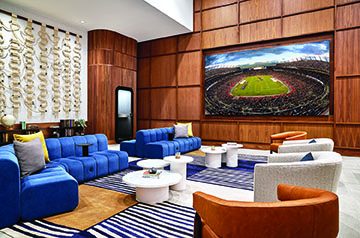
by Mark Smiley | Mar 19, 2021 | Travel
New Lobby Referred To As The 16th Street Mall Living Room
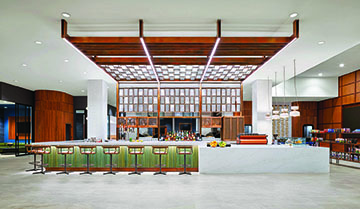
Bar Bar: The 16th Street Commons Coffee Bar Bar transitions guests from day (coffee) to night (cocktails) with food and beverage options that are locally sourced. It sits in the center of the redesigned lobby at the Sheraton Denver Downtown.
by Mark Smiley
The Sheraton Denver Downtown completed a full-scale renovation of its guest rooms, lobby, public and meeting spaces as part of Sheraton’s worldwide transformation of its guest experience vision. Only one other hotel in North America (Sheraton Phoenix) was commissioned for such a renovation. The conceptual phase started in 2013 and continued through 2016 when Marriott International purchased Starwood Hotels & Resorts Worldwide for $13 billion. The concept became a reality in February 2021.
“We are honored to be one of the first hotels to bring the new Sheraton brand to life in the heart of Denver,” said Tony Dunn, General Manager for the Sheraton Denver Downtown. “The renovation will serve to highlight what is already incredible about the local Denver community — and bring the best of the Sheraton brand to downtown. As travel starts to resume, these changes will strengthen Denver’s position as a global gathering place for groups, conventions, guests and locals alike, and will act as a public square for our growing, evolving city.”
The Sheraton was one of the first original town centers in the United States and one of the towers was built in 1959 and was a Hilton Hotel. It was designed by I. M. Pei who is most famous for designing the Louvre Pyramid which sits at the entrance of the Louvre Museum in Paris. In fact, the new fireplace in the lobby nods to Pei’s original tower design, featuring a plaster imprint of the historic ceiling tiles that remain on the tower’s second level.

Media Wall: The 16th Street Commons Sitting Room provides a central gathering area in the lobby bringing the community together with soft seating and a media wall to catch all the big games.
Sheraton Denver Downtown includes Sheraton’s new signature key elements that aim to create an environment where guests can feel comfortable and at ease, whether working, meeting or relaxing. “We want locals to feel like guests and guests to feel like locals,” said Tracy Blair, Director of Sales and Marketing, Sheraton Denver Downtown. “The locals are definitely invited in and if you’re a guest, we want you to experience local flavors. We want you to know you are in Denver.”
The completion of this $80 million hotel renovation changed the face of the hotel and Denver’s iconic 16th Street Mall. Sheraton Denver Downtown has long been a familiar anchor in Downtown Denver, serving as the largest meetings/events hotel in the city. Today, this transformation is officially complete, with all aspects of the hotel updated and refreshed–including a new arrival experience, 133,000 square feet of renovated meeting space and 1,236 newly redesigned guest rooms and 138 suites as well as a new culinary and beverage experience.
“This is a pivotal moment for Sheraton as we see hotel owners embracing the new vision and bringing it to life,” said Amanda Nichols, Senior Director and Global Brand Leader of Sheraton Hotels. “Over the past 80 years, Sheraton has always offered guests the time-honored assurance of a welcoming community. We’re proud to have built on this legacy in the new concept, creating an environment where guests can enjoy all the familiar comforts of the Sheraton brand, but with fresh, contemporary updates. As travel resumes, we look forward to welcoming guests into this new chapter for Sheraton at Sheraton Denver Downtown.”
A Modern-Day “Public Square”
At the heart of the new experience at Sheraton Denver Downtown is the lobby. This has been re-imagined as the “Public Square” of the hotel called the 16th Street Commons; an open space that invites people to join together or be alone amongst others.
Sheraton Denver Downtown features all the signature elements of the new brand vision. This includes the Community Table, a purpose-built workspace that anchors the hotel’s lobby and allows guests to work, eat and drink. Following Sheraton’s philosophy to embrace both form and function, these tables are custom designed with amenities to keep guests productive, including built-in lighting, outlets and wireless charging stations.
The Studios, flexible gathering spaces available to book whenever a guest needs it, is in a less formal setting. Built on elevated platforms and enclosed with glass, the tech-enabled Studios allow guests privacy and focus for everything from small group meetings to private dining experiences. Soundproof booths are also placed around the lobby, ideal for a phone call to connect privately with friends, family or colleagues.
Sheraton Denver Downtown’s new food and beverage offering creates a focal point in the lobby experience. Part bar, part coffee bar, part market, the 16th Street Commons Coffee Bar Bar is a central pillar of the new Sheraton vision, transitioning guests from day to night with food and beverage options that are locally sourced. “It’s really the focal point now for the lobby,” said Blair. “The food and beverage is pulled out from the corners and walls and it is placed as a focal point of the community. We feel we are the living room of the 16th Street Mall.”
Guest Rooms
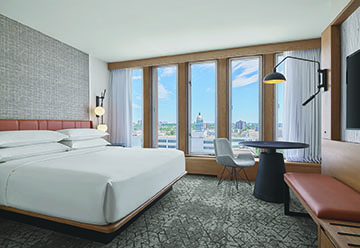
Remodeled Rooms: All of the guest rooms, including king accommodations (pictured) have been newly remodeled.
The new guest rooms, which were torn down to the studs during renovation, feature a bright, well-lit space with warm, residential appeal, comprised of soft finishes and light wood tones accentuated with black metal accents. The rooms have new tools for productivity, such as a height-adjustable worktable, integrated power and charging and layered lighting; while still retaining some of the classic Sheraton signature amenities, including the Sheraton Sleep Experience platform bed. The guest bathroom has also been completely redesigned with new and modern walk-in showers.
Sheraton Denver Downtown is following all of Marriott International’s Commitment to Clean protocols, created in partnership with leading experts in food and water safety, hygiene and infection prevention, and hotel operations. These protocols include mandated mask-wearing for all guests and associates within the hotel, and the use of electrostatic sprayers and disinfectants recommended by the Centers for Disease Control and Prevention and World Health Organization to sanitize surfaces throughout the hotel.
For more information on the Sheraton Denver Downtown, visit www.marriott.com/dends.
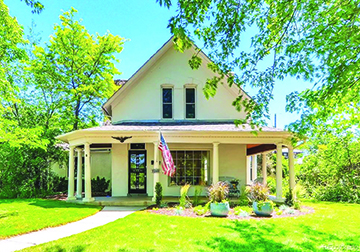
by Mark Smiley | Mar 19, 2021 | Main Articles
Wash Park Home Built In The 1890s Faces Wrecking Ball; ‘Park Won’t Be The Same If Home Is Razed,’ Residents Stress
by Glen Richardson

Stunning Site: Home, sweet historic home’s prominent location creates an established and familiar feature for both Wash Park and the Mile High City.
In a neighborhood where real estate is in high demand, demolition threatens a rare Wash Park Queen Anne home built no later than 1890. Neighbors were surprised and shocked when a demolition notice was posted at the 800 S. Franklin St. home by the City & County of Denver.
The oldest occupiable property from the 19th Century remaining in the neighborhood, it is located on a large corner lot across Franklin St. from Wash Park and across E. Ohio Ave. from St. John’s Church. The home is a rare remaining example of the Queen Anne Style in West Washington Park.
Representing the distinctive visible characteristics of a Queen Anne, it has the asymmetrical massing including projecting octagonal bays, steep gabled roofs, deep classical eaves and hooded windows. The porch features Tuscan order columns and classical entablature — an architectural section located above the columns on the building’s exterior. Largely developed 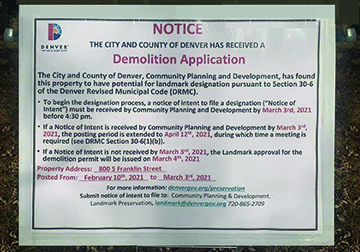 in the period between the world wars, many of the houses in the neighborhood were constructed in more revivalist or eclectic styles such as Tudor revival or Craftsman.
in the period between the world wars, many of the houses in the neighborhood were constructed in more revivalist or eclectic styles such as Tudor revival or Craftsman.
Saving Historic Site
Ironically the bid to bulldoze the $2,300,000 home was posted in March as Historic Denver began celebrating five-decades of saving and highlighting historic treasures under threat of annihilation. The non-profit got started by saving the Molly Brown House from demolition in 1970. The organization is hosting a 50th bash at the Molly Brown House Museum now through Sept. 19. The celebration includes a “50 Actions for 50 Places” campaign for sites worthy of preservation action.
Sixth generation Coloradan Drew Carder — who has spent nearly his entire life in Wash Park — is among the neighborhood admirers and supports nominating the Franklin St. home as a community mecca worthy of preservation protection. He says he doesn’t know much about the home other than it is one of the last remaining pieces of the neighborhood’s history. “I feel like this community should be given more of a chance to respond.”
Like Carder, Justin Moorland has spent most of his life in or around Wash Park. Today he lives on the 600 block of S. Gilpin, one block away from the Franklin St. house. “It has always been my favorite home at the park. I find it unique because of its obvious age, modesty and setting. It is truly from another era.” Admits Liz Schanker, “I guess that proximity gives me extra incentive to save the home.” She lives right next door to 800 S. Franklin and says she has lived in Wash Park long enough to be able to imagine the structure that would go up on the site and doesn’t want that to happen. “There is a plethora of new, urban mansions in the neighborhood but only one white farmhouse that predates the park.”
Stunning Setting
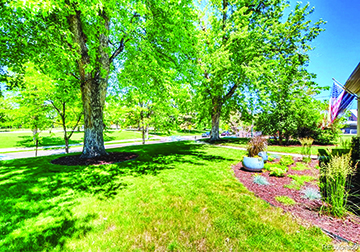
Stunning Site: Home, sweet historic home’s prominent location creates an established and familiar feature for both Wash Park and the Mile High City.
Set far back from Franklin St., the home has an unusually large front yard at the corner of E. Ohio. Because of the house’s large, open lot and prominent location, it creates an established and familiar feature for both Wash Park and the Mile High City. One of the neighborhood’s first buildings, it was constructed before the City of Denver became the City and County of Denver. Moreover, despite its age the house retains a high degree of integrity.
The original Queen Anne structure has experienced some alterations including the stuccoing of the masonry, the northern addition plus alterations to some window openings. Nonetheless, it still retains integrity of design, materials and workmanship to communicate its Queen Anne style. The home is in its original locations, and while the area around the house has been altered over time, the house retains its setting through its relationship to Washington Park and Smith Lake. The interior includes a breakfast nook, vaulted ceilings, walk-in closets and fireplace. The structure is encircled by a wrap-around front porch.
Bid To Bulldoze
Wash Park developer-builder Aaron Grant is the person seeking demolition of the historic home. He is owner-managing-broker of South Gaylord St.-based Grant Real Estate Co. Retailers and residents will recall it was his firm that bulldozed long-standing stores along Denver’s second oldest commercial block to build Park Coworking. The company website claims, “We maintain history and character in the Wash Park neighborhood through real estate design and development.”
In conversations with relatives of the owner who sold the house to Grant Real Estate, neighbors were purportedly told that Grant articulated to them “what they wanted to hear as a seller.”
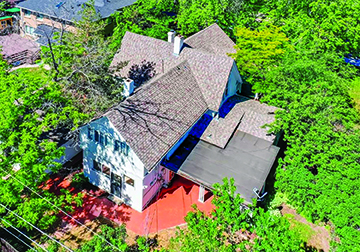
Treasure Threatened: Demolition threatens this rare Queen Ann home located across Franklin St. from Wash Park. The oldest occupiable property from the 19th Century remaining in the neighborhood, the house has retained a high degree of integrity despite its age.
At the time he was purchasing the property, Grant also allegedly indicated that he wanted to keep the shell of the home and remodel the interior. “We know now this was probably never his intent,” they say.
Noteworthy Owners
According to the Denver Assessor’s records, 800 S. Franklin St. was constructed in 1890. If the date is accurate, it would make the house one of the earliest remaining buildings in the West Wash Park neighborhood. Additionally, it confirms the house was built prior to the City of Denver becoming the City and County of Denver, which was not until 1902.
The earliest record of home ownership was by lumber tycoon Joseph Sterling who started Sterling Lumber & Investment Co. Records suggest, however, the house may be older that 1890 as a 1900 fire destroyed building records prior to 1890. The last prominent person to live in the Franklin home was William H. Burnett, a distinguished jurist who served on the Denver County Court for 17 years.
In 1964 Burnett served as President of the Judicial Research Foundation and became head of the American Bar Association’s Section of Judicial Administration. The judge lived at the Franklin St. address with his wife Margaret from 1963 until his death in 1973. He was at the height of his career when he lived at the address, therefore the property bears a strong association with him and his significance as a local judge and reformer.
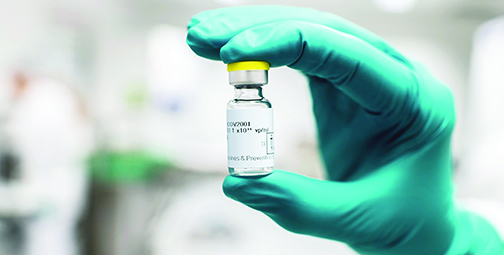
by Luke Schmaltz | Mar 19, 2021 | Main Articles
“Humans are startlingly bad at detecting fraud Even when we’re on the lookout for signs of deception, studies show, our accuracy is hardly better than chance.” – Maria Konnikova
 by Luke Schmaltz
by Luke Schmaltz
Over the last year, the pandemic has proven that there is no level of trickery that is too low for some people.
Humanity’s ever-industrious scammer contingent will seemingly stop at nothing to achieve its prime objective — to separate you from your money. The current populace of frightened, poorly informed, emotionally vulnerable people has created a lush marketplace for fraud. Folks who desperately want to stop isolating, masking and disinfecting their lives away and get back to living them instead are falling victim to COVID-19 vaccine scams.
These ploys are disguised as websites, emails, phone calls, text messages and — yes — personal visits to your home. The perpetrators make an offer, convince victims to provide personal information or money and then they disappear. Here are some of the scams currently underway and how to spot them.

Free Vaccines: The vaccines from Johnson & Johnson, Moderna and other companies should be free, no exceptions. Image: Johnson & JohnsonFree Vaccines: The vaccines from Johnson & Johnson, Moderna and other companies should be free, no exceptions. Image: Johnson & Johnson
All Vaccines Should Be Free
Moderna, Johnson & Johnson, Pfizer and their emerging vaccine-making counterparts are being compensated by the U.S. Government. There should be no cost to you other than a small administration fee, if any. If someone approaches you via phone call, text message, email, or in-person visit with an offer to “sell” you a dose or a vial of vaccine, report them to the Federal Trade Commission (FTC) at ReportFraud.ftc.gov. Sinovac is a China-based company which has tested a successful vaccine, yet this is not approved for distribution in the United States. Regardless, several social media campaigns were running ads claiming to be making this vaccine available for American consumers — for a price.
Scammers Have Bad Grammar
Anyone with a computer, an internet connection and a few basic skills can make websites and send emails. Since most of the vaccine scams are purported by criminals who are overseas, their lack of skill with the English language will be apparent in the text of the email or website landing page. In the case of an email, look for basic mistakes in punctuation, pluralization, spelling and euphemistic language. Also, no signature on an email is a red flag as is any email that appears to be from a government agency, pharmaceutical company, or a vaccine distributor. Websites offering vaccines will be using a specific set of keywords in their titles to attract traffic. Be on the lookout for terms such as “private vaccine, testing update, COVID validator, cure COVID, testing update, Corona vaccine and COVID -19.”
Phishy Phone Calls
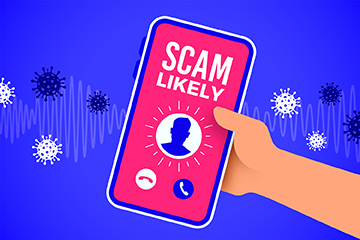
Phone Scams: Phone calls from scammers are the main way scammers separate people from their money.
Stateside scammers or those with a believable command over American English may call you out of the blue. They will claim to be working in some sort of an official capacity, either for a pharmaceutical company, a healthcare provider, the Centers for Disease Control (CDC) or some branch of the U.S. Government. The next giveaway is that they will ask you to “verify” your identity by providing them with some sort of personal information whether it is your Medicaid policy number, your birth date or your SSN. Some of them may go so far as to tell you they are going to show up and personally administer the vaccine for you. Remember this: whether on the phone or via email, verifiers are liars.
Bad Business
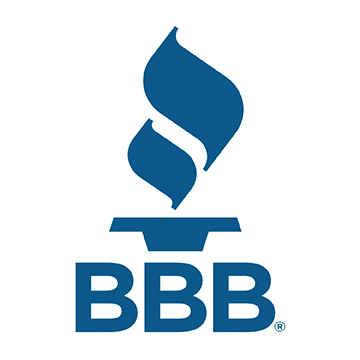
BBB: The Denver Better Business Bureau is keeping tabs on local and international scammers via their Scam Tracker Tool.
Meanwhile, the Denver chapter of the Better Business Bureau is keeping tabs on these scammers. Content and PR Specialist Keylen Villagrana offers insight into an array of both international and locally-run
scams. “Fake unemployment claims, stimulus check scams, puppy scams ([they] are rising as more people are working from home) and employment scams for work-from-home positions. [There is] even an elaborate romance scam operating overseas where victims are turned into ‘money mules’ in order for scammers to retrieve fake unemployment claim money. They use victims for their U.S. based bank account and ask them to wire money to a bank account [that is] very likely overseas. (Wire transfers can’t be traced),” she says. Of all the current ruses, one is unanimously more popular than the others. Villagrana explains, “Consumers are contacted after they have received the COVID-19 vaccine (although many are contacted that haven’t even received the vaccine), to take a survey and in exchange for a ‘gift.’ All they have to do is pay for shipping and handling ranging from $2.99-$19.99 depending on
the gift they choose. Most never receive anything and some have reported unauthorized charges.” Folks are in luck, however, as this agency keeps a running tally on all past and current scams via their “Scam Tracker” tool available here: www. bbb.org/scamtracker.
Trash Can Treasure
Ads such as the one mentioned above claiming to be selling vaccines should be disregarded. The messaging features such as Facebook Messenger are also avenues scammers will take to try and get your attention through personal messages containing “incredible” deals on Covid-19 vaccines. The main rule of thumb here: if it sounds too good to be true, it’s a scam.
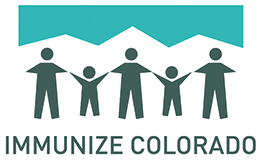
Legitimate Source: Immunize Colorado is one of the legitimate sources of “real” vaccinations.
Some Lines Can’t Be Skipped
Yet another scenario involves scammers who claim to be able to do the legwork for you and “track down” your vaccination. Others offer a similar service by promising that they can use their contacts in the medical industry to help you “skip the line” and get a vaccination sooner than the current tiered rollout system allows. These are scams that will require the service fee be paid in advance and once the money is sent, that’s all she wrote.
Thankfully, legitimate sources are standing by to provide citizens with answers about the specific tiers of the vaccine rollout and where the efforts are on the projected timeline. You can find out more by going to Colorado Vaccine Equity www.colorado vaccineequity.org, Immunize Colorado www. immunizecolorado.org and the Colorado Department of Health and Environment covid19.colorado.gov.

by Glendale Sports Center | Mar 19, 2021 | Feature Story Bottom Left
How Medical Research Impacts People From All Walks Of Life
by Jessica L. Giffin, MPH, CHES, CIC, YMCA of Metro Denver
 Did you know that in Denver, neighborhoods that are only two miles apart can have a difference of 10 years in average lifespan for residents? Or that depression and childhood obesity rates are four times higher in certain neighborhoods?
Did you know that in Denver, neighborhoods that are only two miles apart can have a difference of 10 years in average lifespan for residents? Or that depression and childhood obesity rates are four times higher in certain neighborhoods?
There are so many different factors that can influence someone’s health — diet, lifestyle and the environment where you grew up or currently live in. Despite this fact, health care often takes a “one-size-fits-all” approach and struggles to understand the differences that make us each unique. That’s where the All of Us Research Program comes in.
The All of Us Research Program is funded by the National Institutes of Health and seeks to enroll one million or more people from across the United States to help speed up medical research. The YMCA of Metro Denver is a proud partner with All of Us. It’s programs like the YMCA Diabetes Prevention Program and Blood Pressure Self-Monitoring that are products of medical research and it’s the goal of the YMCA to continue to provide robust programs that meets the needs of the people who need them most.
Now YOU can have the opportunity to be reflected in health research!
What can you expect by participating in the All of Us program? People who join will share information about their health, habits, and what it’s like where they live. By developing a diverse database and resource that researchers can use to study precision medicine, we are creating a future where health care is tailored to you.
As a member of the community, you can play a role in the fight for equitable medical research and its value in creating life-changing programs, medicines and other solutions that reflect the diversity of the people who need them.
In times like these, we can see the importance of health research. It is the efforts of the NIH, along with many others, that help researchers learn more about all kinds of conditions and illnesses — including COVID-19 — and their impact on people from all walks of life.
You have the power to drive health research. Without you, it won’t be All of Us. If you are interested in learning more, visit www.denverymca.org/all-us-research-program.














